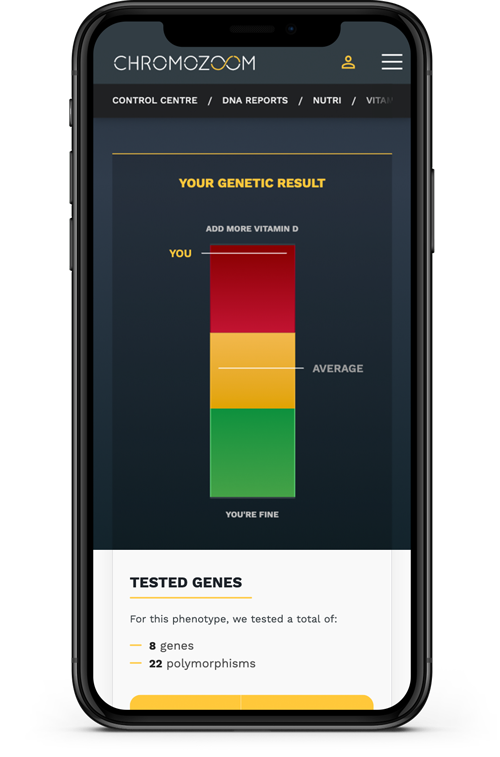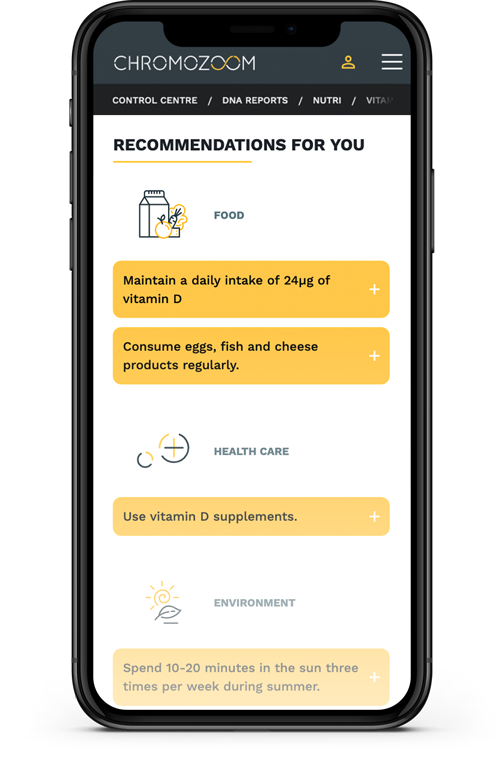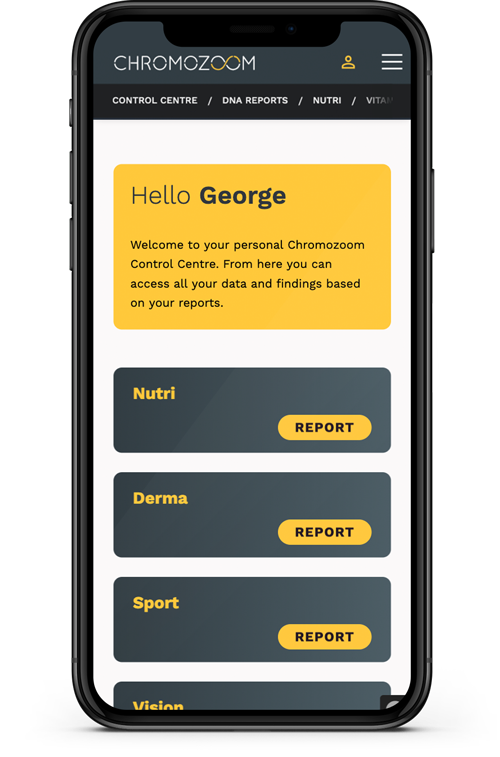Request a DEMO
If you are interested in our product, request access to demo account here. Leave us your email and you will receive login information.

Boost your energy with ChromozoomNutri

In our fast-paced world, it has become normal to burn the candle at both ends. As we try our best to balance work and family commitments, many find themselves with a chronic lack of energy. Thankfully, it doesn’t have to be this way. Let us discover the exact nutrition your body needs!

ChromozoomNutri
Some people simply can't tolerate this gluey, chewy protein in bread. If this is you, chances are you’ll test negative for celiac disease. Identifying gluten sensitivity is tricky, partly because your body may suffer a delayed reaction. Perhaps that’s why up to 97% of cases of gluten sensitivity go undiagnosed. Take our DNA test to find out if you’re genetically at risk from gluten, and explore strategies to protect your gut health.
Do creamy desserts or other milk-based foods give your bloating, cramping and wind? The milk sugar in such foods could be the problem. Many Europeans have a gene that allows them to digest milk sugar (lactose) into later life. But some people lack this gene – especially if they are of East Asian, West African, Arab, Jewish, Greek, or Italian descent.
Test your DNA to find out if it’s milk sugar that’s bothering you and if so, what can you do about it. In this product we also test your susceptibility to an allergy to the proteins in milk.
Peanut allergy is one of the most common food allergies in children. This life-threatening allergy used to be considered a lifelong condition but it’s emerging that some children do grow out of their peanut allergy. Are you and your family members particularly at risk of getting a peanut allergy? And if so, what preventive action can you take now to protect your health in years to come.
Whole aisles in the supermarket are devoted to sugary treats, such as puddings, milkshakes, cakes, fruit juice drinks, dark chocolate, and cereals. But how much table sugar (sucrose) can your body také? Could a typical British shopping basket supply you enough sucrose to knock your blood glucose out of whack? In this test we look for SNPs that may protect you from blood glucose spikes (and the rebound drop in blood glucose), after eating carbohydrates. Discover your sucrose risk-rating and what you can do about it.
Have you noticed that you get a headache, stuffy nose or a rash after drinking red wine? One possible cause is an overreaction to the naturally-occurring histamines in red wine. Can you safely indulge in high-histamine foods such as aged cheeses, and fermented foods including the health drink kombucha? Explore what your genes say about your histamine tolerance.
Does eating too much fruits and soft drinks give you stomach ache, flatulence or diarrhoea? These high fructose foods contain a simple fruit sugar that’s now a popular commercial sweetener. Fructose is under the medical spotlight because dietary intakes have increased tenfold since the 1970s, and are linked to diabetes. So how well equipped is your body to handle high fructose loads? Take this DNA test to discover how likely you are to get side effects and what you can do.
Milk allergy happens when your immune system overreacts to the proteins in dairy products. Find out your risk rating for milk allergy and explore practical advice for your diet. In Nutri, we also test your susceptibility to lactose (milk sugar) allergy too.
Isn’t it time to evolve beyond mere calorie counting? Understanding your genes could be a real weight off your mind, as you discover your own way to achieve your optimum weight. Ever wondered why some people do better on a high-carb diet (particularly complex carbs), why others must cut out certain fats, and why a third group can slim down on diets rich in nuts, avocados and olive oil?
You know the answer already – nature loves variety. Your body is unique. So discover how you can look, feel and actually be lighter.
Take the doubt, guilt and indecision out of feeding your heart. For some people, eating more nuts improves their blood lipid profile, for others salmon and mackerel are the best food medicines. While for anyone sensitive to saturates, cutting out fried food is a must. We analyse the effects of different fats on your cardiovascular system, and we also predict which antioxidant will best help you rebalance your blood lipids and soothe enflamed blood vessels
This report is again about heart health, and which kinds of fat you, personally, should be limiting. When we digest fats, they are absorbed and turned into simple fats called triglycerides. We all have these floating around in our bloodstream, attached to special transporter molecules. Some people are genetically prone to having high triglycerides (linked to clogged arteries) but only if they eat too much of certain types of fat. So which fats should YOU avoid? Test yourself to discover whether to go easy on the bacon grease, the olive oil or other vegetable oils.
Should you go for a high-fat, low-carb diet? Or would the reverse suit you, personally? The answer to that lies largely in your genes. Eat right for your genotype and you might even stop diabetes in its tracks. In this report, we’ll explore which nutrients, diets and foods could help regulate your blood glucose levels. And if you already have diabetes, then read on – we will suggest foods to help you manage your blood glucose and so prevent complications arising in future.
Does high blood pressure run in your family? If you lower your blood pressure, your heart, your eyes and your kidneys will thank you for it. Aside regular exercise and managing your weight, it’s a good idea to avoid trigger foods. Coffee, salty foods and fried foods may all cause blood pressure spikes, depending on your genes. In this report, we flag up possible dietary weak spots, based on your genetic profile, and suggest ways you can defend yourself against high blood pressure.
Although there are official target intakes for every vitamin, designed to suit 97.5% of the population, many people are walking around with subclinical deficiencies in nutrients without realising it. So if you could predict which vitamins you’re liable to run low on, surely you’d want to top up your levels to see if you looked and felt better?
For genetic reasons your body may need more than the standard amount of a particular vitamin. Perhaps your body has trouble absorbing the nutrient, transporting it to where it’s needed, or turning it into the active form used by cells.
We’ll test your DNA for polymorphism linked to nine key vitamins, giving you tips on how to boost your intake – whether through diet or supplements.
Trace elements form a crucial part of proteins and enzymes – they make sure the body’s biochemistry works correctly and at the speed required. We will test your DNA for variations linked to shortages of six trace elements. These elements include magnesium, iron and zinc – crucial for joining up proteins, fatty acids and vitamins.
As with vitamins, your body’s ability to get enough of a particular trace element maybe hampered by barriers to absorption, and proper transport. And for the affected nutrients, we suggest ways you can boost your levels, and so enhance your well-being.
Many chronic diseases – including obesity – it’s emerging are linked to underlying inflammation. And oxidative stress from toxic chemicals, UV light and so on tends to worsen inflammation. In contrast, antioxidants support the body in fighting oxidative stress, and so can help to nip inflammation in the bud.
We have tested your DNA for variations linked to how well your body uses six key antioxidants – monounsaturated fats, omega 3s, quercetin, vitamin D, E and zinc. In this report, you'll discover which antioxidants could be your most powerful allies in reducing inflammation, and how they can help you protect your wellbeing now and for years to come.



The DNA collection kit serves as a tool for collecting the DNA sample from the comfort of your home.

ChromozoomNutri
If you are interested in our product, request access to demo account here. Leave us your email and you will receive login information.